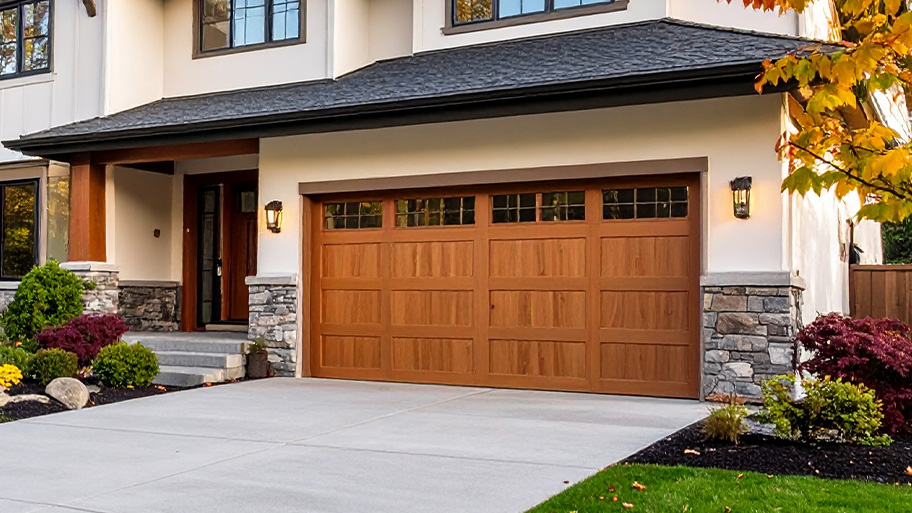
Replacing a garage door is necessary to add security and value to your home. Learn how each door type affects the total cost of this project.
Run—don’t walk—away from DIY garage door installations


DIY garage installations may save a few hundred bucks on labor costs but come with plenty of inherent risks.
Installing a modern garage door requires specialized tools and equipment.
Incorrectly installing a garage door is physically dangerous and could force some costly repairs down the line.
Misaligned garage door tracks and miscalibrated safety sensors open your home up to intruders.
Installing a garage door yourself voids the manufacturer’s warranty in many cases.
Your garage is more than just a large storage closet for tools, malfunctioning appliances, and, yes, automobiles. It’s one of the primary entrances to the rest of your home. With that in mind, installing a garage door by yourself may save a few bucks but could cost you in the long run. Here are six reasons you should contact a qualified garage door technician near you for an installation instead of doing it yourself.
You can’t just open up your toolbox and install a garage door, as they require all kinds of specialized tools and equipment for a successful installation. For instance, you’ll need a counterbalance spring system to lift the door and torsion spring winding bars to create necessary tension.
Of course, modern garage doors also include a robust electrical component. In other words, you’ll also need plenty of gear to install and hook up the motor, the control panel, and more. All of this is in addition to standard tools like locking pliers, adjustable wrenches, screwdrivers, and sturdy ladders.
Garage door installations require specialized tools and equipment because they’re incredibly complicated, with plenty of variables and moving parts. Your average modern garage door includes plenty of hinges, springs, and electrical components that all work in conjunction with each other. One small mistake or incorrect part causes the whole system to fail. You’ll be managing all these complex and sometimes tiny components while dealing with the severe weight and cumbersome form factor of the door itself.
Additionally, all garage doors are different and suit the needs of differing homeowners. For instance, garage doors include wind ratings to handle severe weather events.

As previously mentioned, garage doors are heavy and filled to the brim with unique yet necessary components and parts. By their very design, garage door springs work under a tremendous amount of tension and pressure. In other words, an incorrect installation could cause that door to come careening down at an inopportune moment, leading to costly repairs or, much worse, a trip to the hospital. Additionally, it’s all too easy to incorrectly install the garage door tracks or the safety sensors, making the main entrance to your home vulnerable to interlopers.

Garage door installation costs $1,200 on average, with labor accounting for around $300 of that total. So, in theory, performing a DIY garage door installation saves you $300, but it’s not that simple. Garage door installation companies have built relationships with component manufacturers, so they purchase the parts cheaper than the prices advertised at your local hardware store.
Also, there’s the issue of repairs. A poor installation is bound to fail eventually, leading to costly repairs down the line. The cost to hire a garage door repair pro ranges from $75 to $150 per hour. You’ll lose the $300 you saved on labor with just two to four hours of necessary repairs.
Most garage doors ship with a manufacturer’s warranty covering certain repairs and maintenance tasks. These warranties typically last around five years but, unfortunately, often require a professional to install the door. In these cases, if you opt for a DIY installation, the warranty becomes null and void.
If you are dead set on putting the door in yourself, make sure the manufacturer’s warranty allows it before purchasing the parts. Other things also nullify garage door warranties, including accidental damage, vandalism, fire, and purposeful alteration.
Avoid all of the above issues by hiring a qualified garage door pro near you to install your garage door. Competent pros offer plenty of advantages with garage doors.
First of all, they have the appropriate licensure to do the work, so your warranty remains snug as a bug in a rug. They also have their own insurance plans if something goes wrong during the installation, which causes damage to the door itself or other parts of your home. Finally, and most importantly, a good pro has installed hundreds upon hundreds of garage doors. They’re intimately familiar with most designs and should get it up and running with minimal hassle.
From average costs to expert advice, get all the answers you need to get your job done.

Replacing a garage door is necessary to add security and value to your home. Learn how each door type affects the total cost of this project.

Replacing a garage door is necessary to add security and value to your home. Learn how each door type affects the total cost of this project in Columbus, OH.

A side sliding garage door costs a pretty penny, but there are serious advantages vs. tilting garage doors. Learn what affects the cost of this seldom-seen door type.

Not sure who to call to install a garage door opener? The right person for the job is someone with experience in all garage door-related areas.

We’ll walk you through how to lubricate your garage door, including the hinges, rollers, and springs, in four simple steps.

Our guide walks you through how to program a garage door remote to your mounted opener in three easy steps and in just a few minutes.